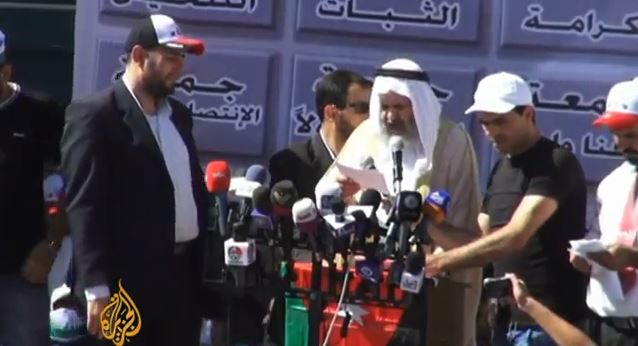 Opposition groups protest in Jordan on October 5, 2012. (Al-Jazeera)
Opposition groups protest in Jordan on October 5, 2012. (Al-Jazeera)
Estimation and outlook on the situation in Syria and the region – Part 4
Jordan´s strains
Jordan feels the strains of the Syrian situation as well. Throughout its history, the kingdom did steadily and carefully adjust to changing situations, constantly balancing pressure from bigger Arab countries and the West.
Though the kingdom gave Syrian opposition fighters training ground on limited scales, it did resist demands from Qatar and Saudi Arabia to heavily arm the Syrian opposition.
Dark days not forgotten
Jordan had – and still seems to have – limited security coordination with the Syrian government and no interest in well trained and geared up militias at or within its borders.
The PLO Back September lesson of the 1970s is deeply engraved as a grim warning in King Abdullah´s family history, and the example of deceased Jordanian al-Qaeda leader in Iraq Abu Musab al-Zarqawi as well.
The Jordanian royal family and its power remained largely untouched by political uproar that came with the “Arab Spring”. But King Abdullah II. has to keep an eye on his domestic opposition, namely the Muslim Brotherhood movement. Opposition groups hold demonstrations regularly, asking for political and economical reforms.
Challenge by Muslim Brotherhood
Should Syrian President Bashar al-Assad fall, the Jordanian Brotherhood would surely feel emboldened by potential success of its Syrian branch and seriously try and challenge the Jordanian royal dynasty.
We think Jordan will follow suite regional and international players and slowly curb support for the Syrian opposition, thus leaving southern Syria exposed to recapture by the Syrian government.
Israel is content with Assad
Israel’s situation is the clearest among Syria´s neighbours: It is content with a sitting Bashar al-Assad, weakened by the war, and has nothing to win from regime change. Such would only expose Syria to an Iraqi or Somalian scenario that could ignite the whole region and take it into the abyss.
Israel will continue to bomb potential weapons convoys en route to Hezbollah, but not responds heavily to occasional shelling of the Golan Heights. We don’t think there is a real front building up along that disputed piece of land.
Worries about Lebanese-Syrian border
What is in fact a point of concern for Israel is the consolidation of Syrian government forces along the Lebanese border.
Israel wants to cut off Hezbollah from game-changing weapons, which – by all likelihood – take their route, dismantled, over the green border and – to a minor extend – Beirut airport and port.
No good choices
Choices for Israel here are all uneasy: Identifying potential rockets has become more difficult, and Israel cannot just bomb alleged or real weapons convoys too often without risking face-saving responses by Syrian President Bashar al-Assad that might culminate in an unintended war nobody is looking for at the moment.
This is an estimation of possible future developments that we anticipate. In the next part of this series we will talk about developments in Iraq and how they could influence Syria.
